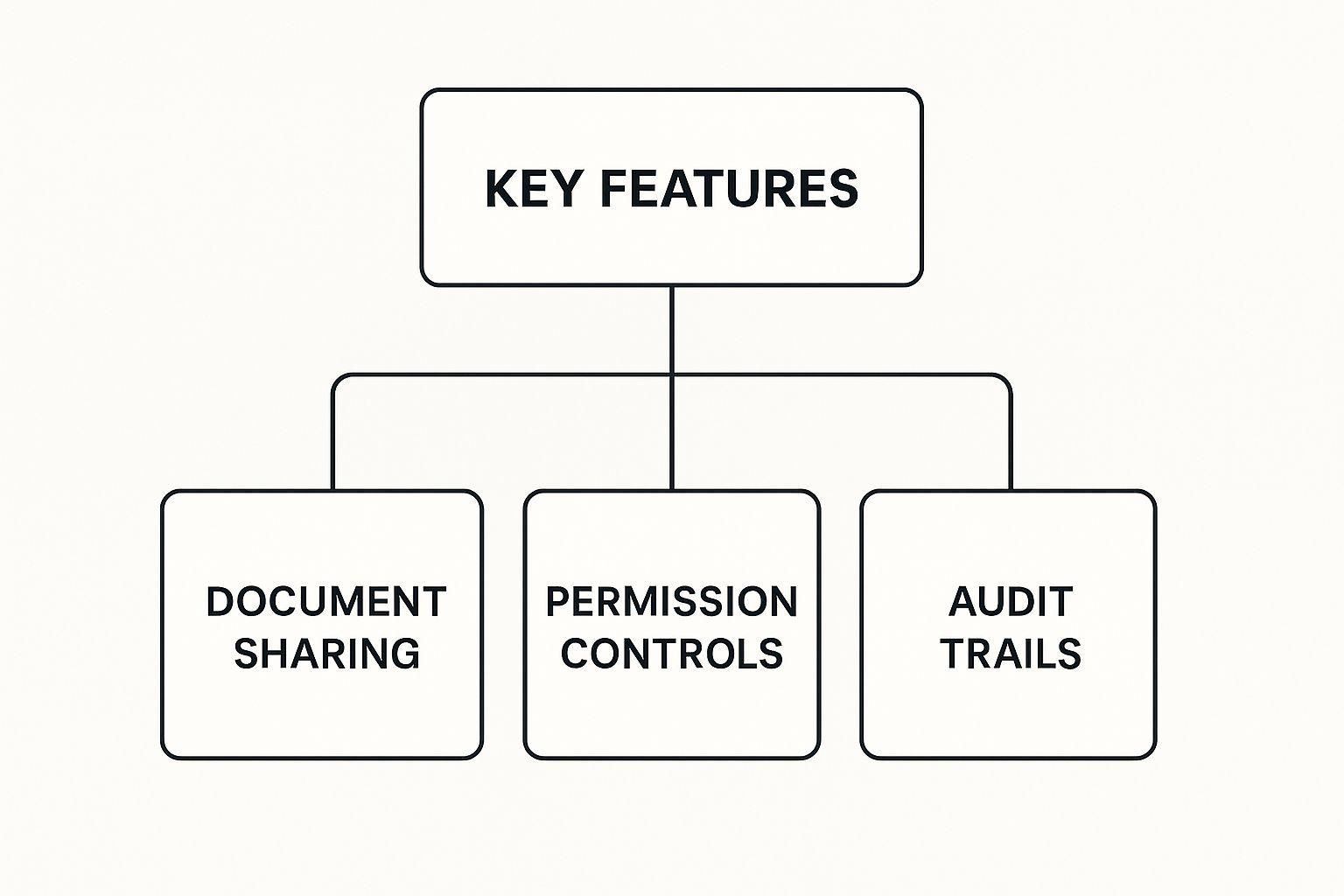Deal Room Software: Streamline Your Deal Success Today
Deal Room Software: Streamline Your Deal Success Today
Discover the best deal room software to manage your deals efficiently. Learn how our solutions can boost your deal success and collaboration.
Domingo Valadez
Jun 22, 2025
Blog
What Deal Room Software Really Means for Your Business
Imagine trying to manage a complex real estate syndication with twenty investors, piles of financial documents, and a fast-approaching deadline. Using standard email and generic file-sharing apps often leads to confusion. A single misplaced contract or an old pro forma can put the entire transaction at risk. This is the exact high-stakes situation where deal room software becomes an essential part of your toolkit.
Think of it as more than just a digital filing cabinet. It's a secure, central command center for your entire deal. It's the difference between building a house with a messy pile of lumber and using a detailed blueprint where every part is organized and easy to find. This software builds a structured environment where every document, conversation, and action related to the deal is tracked and managed.
Beyond Simple File Storage
While sharing documents is a basic function, real deal room software provides much more value. It’s about control, insight, and maintaining a professional image. Top dealmakers use these platforms to coordinate with multiple parties—from investors and lenders to lawyers and accountants—while keeping sensitive information secure. The ability to set specific permissions means a potential investor sees only the marketing materials, while your legal team can access all draft agreements. This level of control just isn't possible with standard cloud storage.
For instance, a platform's dashboard can reveal which investors are most actively reviewing your pitch deck.

This view provides immediate, useful information, helping you concentrate your follow-up efforts where they are most likely to pay off.
The Strategic Advantage in Practice
The real-world benefit of using dedicated deal room software is most apparent during critical stages like due diligence. Instead of fielding individual email requests, you can give all parties access to a pre-organized data room that includes version control and audit trails. This not only speeds up the process but also presents your operation as highly organized and transparent, which builds vital trust with capital partners. Major transactions, like the $59.5 billion merger between Exxon Mobil and Pioneer Natural Resources, depend on this type of structured data exchange to succeed.
A key part of finalizing deals and understanding what deal room software offers your business is the ability to secure agreements, a process made easier with a solid contract review checklist. In the end, this technology delivers more than just efficiency; it provides peace of mind. By centralizing communication, securing documents, and offering clear insights into stakeholder activity, it helps real estate sponsors manage complex transactions with confidence, professionalism, and a much higher chance of a successful close. It is the core infrastructure for anyone serious about growing their investment operations.
How Deal Management Evolved from Chaos to Clarity
Before the digital age, high-stakes dealmaking was a scene of organized chaos. Picture conference rooms buried under mountains of paper documents, legal teams working around the clock for weeks, and entire transactions collapsing because a single, critical contract went missing. This was the reality of due diligence—a physically demanding, inefficient, and incredibly risky process. Deals relied on manual checklists, overnight couriers, and the hope that nothing was lost along the way. This old method not only created immense friction but also introduced major security risks, as sensitive information was passed around with little oversight.
The first big change came with email and basic digital files. While it was a step up from paper, this "digital shoebox" approach created its own set of headaches. Version control became a nightmare, with multiple people editing different copies of the same document. Important messages were lost in sprawling email chains, making it almost impossible to keep a clear audit trail. This period made one thing obvious: a secure, central space was needed to manage deals with precision and confidence.
The Rise of the Virtual Data Room
This need gave birth to the virtual data room (VDR), a secure online repository that became the foundation for modern deal room software. Instead of physical rooms, dealmakers could now grant controlled access to a digital space containing all necessary documents. This was a true game-changer, significantly improving both efficiency and security. The market for these solutions has grown remarkably, showing just how essential they are. Valued at $2.67 billion in 2024, the VDR market is expected to more than double to $6.04 billion by 2029, a clear sign of its importance. You can explore the full market analysis of this explosive growth.
From Storage to Strategic Command Center
Today, the evolution continues. The best deal room software has moved beyond simple document storage. Modern platforms are integrated ecosystems that act as strategic command centers for the entire deal lifecycle. They now include advanced features like:
- AI-powered analysis: Tools that can automatically scan documents for key clauses or potential risks.
- Real-time engagement tracking: Analytics that show which investors are most interested in your deal by monitoring their activity.
- Integrated communication: Secure messaging and Q&A tools that keep all deal-related conversations organized and easy to review.
This journey from chaotic paper-filled rooms to intelligent, AI-assisted platforms marks a fundamental shift in how business transactions are handled. What was once a high-risk, manual struggle has become a data-driven process, giving smart dealmakers a powerful competitive advantage.
Features That Separate Winners from Wannabes
When you're looking at deal room software, it’s easy to get lost in slick designs and endless feature lists. But the real difference between a platform that just stores files and one that helps you close deals comes down to a few powerful capabilities. Choosing the wrong system is like bringing a basic toolbox to a complex engineering job—sure, you have a hammer, but what you really need are precision instruments. The best platforms are built on three core pillars: security, insight, and control.
These pillars aren't just buzzwords; they show up as real features that solve the day-to-day challenges of managing a deal. Without them, you're operating with blind spots, leaving both your deal's momentum and your data's security up to chance. A truly professional system gives you the tools to manage every interaction with precision, keeping confidential information locked down while giving you valuable feedback on investor engagement.
This infographic shows the key features that form this foundation.

The diagram makes it clear: while sharing documents is the first step, the true value of a platform is built on layers of control and oversight.
To understand how these features work in the real world, let's compare the basic functions you'd expect versus the advanced capabilities that give you a competitive edge. The following table breaks down these differences.
Essential vs. Advanced Deal Room Features Comparison
A comprehensive comparison of basic features versus advanced capabilities that differentiate professional deal room platforms
This table shows that while essential features get the job done, advanced features are what truly empower you to manage your deal proactively and securely.
Granular Access and Permission Controls
The most important feature that sets winning platforms apart is granular permission controls. This isn't just an on/off switch. It’s the power to decide exactly who sees what, right down to a specific file or folder. For instance, you can let a prospective investor view your marketing deck but block them from downloading your confidential financial models.
This level of control includes specific actions within the deal room:
- View-only access: Stops users from downloading, printing, or copying text from a document.
- Dynamic watermarking: Automatically overlays a user’s name, email, and the current time on any document they view or download, which discourages unauthorized sharing.
- Access expiration: Lets you set a date and time for a user's access to be automatically revoked, perfect for limited due diligence periods.
This is a world away from a standard cloud drive, where a shared link can be forwarded to anyone, creating a major security risk. Advanced permissions ensure your deal’s confidentiality is never at risk.
Real-Time Analytics and Engagement Tracking
While security locks down your information, analytics give you the intelligence to move the deal forward. Imagine knowing which investors are spending the most time digging into your materials. Top-tier deal room software provides dashboards that track user activity in real time, offering an inside look at your deal's momentum.
You can see which documents are getting the most attention, how long each person spent on a particular page, and who hasn't even logged in yet. If you see that a key investor has reviewed your pro forma 5 times in a single day, that’s a strong buying signal. It gives you the perfect reason to make a follow-up call. On the other hand, if a group of investors is ignoring your legal documents, it might signal a roadblock you need to address. To learn more about these processes, our ultimate guide to real estate deal management software offers more detailed strategies.
Comprehensive Audit Trails
Finally, a complete audit trail is essential for both compliance and accountability. This feature creates a detailed, unchangeable log of every single action taken inside the deal room. It tracks who logged in, when they did it, what documents they looked at or downloaded, and any questions they asked.
This detailed record is incredibly valuable during due diligence and can be a lifesaver if a dispute ever arises. It provides a single source of truth, eliminating any "he said, she said" confusion and demonstrating a professional, transparent process to everyone involved.
Why Real Estate Pros Can't Survive Without This Technology
Real estate sponsors work in a high-stakes world where complexity is a given. Juggling dozens of investors, huge volumes of property documents, detailed financial models, and changing regulations can quickly become unmanageable. Trying to manage these tasks with old-school tools like email and spreadsheets is like trying to conduct an orchestra with a single drumstick—it just creates chaos. This intense mix of moving parts is exactly why modern deal room software has become a vital tool for success.
The challenges that keep real estate professionals up at night are real and significant. For instance, keeping every investor on the same page during a long due diligence process is a huge job. Securely sharing confidential property data with multiple potential buyers or capital partners also carries major risks. One small slip-up, like sending an outdated rent roll or an unapproved document, can shatter credibility and put an entire deal in jeopardy. These aren't just what-if scenarios; they are daily realities that can stop a transaction in its tracks.

Addressing Industry-Specific Hurdles
The best deal room software is built to solve these specific problems. For sponsors managing syndications, the platform acts as a central command center for everything from initial fundraising to ongoing investor relations. Instead of getting tangled in countless email threads, all communications and Q&A sessions are organized and stored right in the platform. This creates a secure, auditable trail that is critical for complying with regulations governing REITs or private placements and ensures every investor gets the same, correct information.
This structured, secure approach to data management is why Virtual Data Rooms (VDRs), a key part of this software, are now standard in many high-stakes fields. The global VDR market was valued at about $1.49 billion in 2025, with strong growth expected. This shows a wide recognition that complex deals need specialized tools, not temporary fixes. You can find more virtual data room software statistics and trends to see just how common these platforms have become.
From Potential Collapse to Confident Closing
The line between a successful deal and a failed one often comes down to document management and professionalism. There are cautionary tales of profitable deals falling apart simply because a critical document couldn't be found in time, or because investors got spooked by a disorganized due diligence process.
On the other hand, there are plenty of success stories where a deal was saved or sped up because a proper deal room was used. When all parties have access to a well-organized, secure, and user-friendly platform, the whole process feels more professional and transparent. This builds confidence, smooths over friction, and lets sponsors focus on what really matters: evaluating the deal itself, not hunting for lost files. By replacing chaos with clarity, this technology provides the structure real estate professionals need to close deals with confidence.
Choosing the Right Platform Without Getting Burned
Picking the right deal room software feels less like buying a new gadget and more like choosing a long-term business partner. The flashiest features or the lowest price rarely tell the whole story. A platform's true value emerges six months later, during a high-stakes deal, when you need reliability, not just bells and whistles. An uninformed choice can lead to years of frustration, security risks, and even lost deals—a costly mistake that is entirely preventable with a structured evaluation.
Many sponsors fall into common traps. One is prioritizing a long list of features over a clean, intuitive user experience. A system that’s hard to navigate creates friction for your investors and internal team, slowing down vital momentum. Another frequent error is being swayed by low introductory prices, only to face surprise fees for additional users, deals, or data storage. A shortsighted decision based on price alone often costs more in the long run.
A Practical Evaluation Framework
To sidestep these pitfalls, you need a solid evaluation framework. Instead of getting lost in marketing claims, concentrate on the factors that directly affect your deal-making process. This requires an honest assessment of how a platform performs in four critical areas: user experience, security, support, and pricing clarity. Think of it as a report card that helps you compare your options objectively.
For example, when looking at security, don't just accept a checkmark next to the word "secure." Ask for specific certifications like SOC 2 Type II, which validates a company's security controls over time. When considering support, think about what happens when a critical document fails to upload at 10 PM on a Friday. Is there a real person available 24/7, or are you left dealing with a chatbot?
Building Your Selection Scorecard
To make this process systematic, use a simple scorecard to grade potential vendors. This method ensures you're making a fair, data-driven decision rather than an emotional one. By weighing the criteria based on your firm’s priorities, you create a custom tool for your evaluation.
The table below provides a template for this. It helps you assign a weight to each criterion based on what's most important for your operations and then score each platform accordingly.
This systematic process forces an honest conversation about what truly matters for your business. It moves the focus from a vendor's sales pitch to how the deal room software will actually perform as the backbone of your transactions. This ensures you choose a platform that helps you grow without getting burned.
Implementation Strategies That Actually Work
Investing in powerful deal room software is a critical first step, but it’s the implementation that separates a successful investment from a frustrating expense. Think of it like buying a professional-grade kitchen. Having top-of-the-line appliances doesn't make you a great chef; you need the right recipes, organization, and techniques to produce amazing results. Similarly, a thoughtful rollout strategy is what unlocks the full potential of your new platform, preventing chaos and ensuring user adoption from day one.
A clumsy implementation can quickly undermine the software’s benefits. Common mistakes include creating overly complex folder structures that confuse investors, failing to provide adequate training for your team, and setting up security permissions that either lock out necessary parties or, worse, expose confidential information. These missteps not only cause immediate frustration but can also damage your firm's reputation and create deal-killing friction.

Building a Logical Deal Room Structure
The foundation of a successful implementation is a clean and intuitive structure. Before you upload a single document, map out a standardized folder hierarchy that will be used for every deal. This blueprint creates consistency and makes it easy for stakeholders to find what they need without assistance.
A proven approach is to organize folders by the stages of a deal:
- 01 - Marketing & Initial Outreach: This folder holds the investment summary, pitch deck, and other high-level materials for prospective investors.
- 02 - Due Diligence: A more restricted area containing financials, property reports, legal documents, and environmental assessments.
- 03 - Closing Documents: Reserved for subscription agreements, operating agreements, and executed contracts.
- 04 - Post-Closing & Investor Reporting: This is where you will share ongoing updates, K-1s, and distribution notices.
This logical flow guides users naturally through the transaction lifecycle, reflecting a professional and organized process.
Establishing Clear Naming Conventions
Alongside a good folder structure, you need a strict naming convention for your files. This simple discipline prevents massive headaches when multiple versions of a document exist. A simple, effective format is:
[Project Name]_[Document Type]_[YYYY-MM-DD]_[Version]
For example, a file named 123MainSt_ProForma_2024-10-26_v3.pdf is instantly understandable. This clarity is invaluable months later when you need to find the final version of a critical file without digging through old emails.
Overcoming Resistance and Driving Adoption
Change management is just as important as the technical setup. It's natural for some team members to be skeptical or resistant to a new system. To get everyone on board, focus on the "what's in it for them." Show your acquisitions team how the software saves them from late-night email searches and demonstrate to investor relations how it professionalizes their communications.
The widespread shift toward these platforms is clear. The digital sales room software market, a close relative of deal room software, was valued at around USD 1 billion in 2024 and is projected to hit USD 5 billion by 2033. This growth highlights the industry-wide recognition that structured, digital environments are essential for modern business. You can read more about the rising adoption of these engagement tools. By framing the implementation not as an obligation but as a strategic upgrade, you can turn hesitant users into enthusiastic advocates.
Success Stories That Show What's Possible
Theoretical benefits are one thing, but seeing deal room software in action reveals its true power. The difference between success and failure often comes down to how well a deal is managed. These real-world examples show what happens when technology replaces chaos with clarity, helping dealmakers overcome common hurdles and achieve better outcomes.
Accelerating Due Diligence in a Tech Acquisition
Imagine a fast-moving tech startup acquisition. The buyer needed to perform detailed due diligence on a tight schedule, which meant reviewing hundreds of contracts, IP documents, and financial records. Instead of fielding constant email requests, the seller used a deal room to create a highly organized, indexed library of every necessary file and simply granted access.
The buyer's team used the platform’s Q&A module to ask specific questions directly on documents. This created a clear, auditable trail of all communication. The result? The due diligence process was accelerated by 40%. This speed wasn’t just about being efficient; it built trust and kept the deal moving forward, avoiding the kind of delays that often lead to deal fatigue and collapse.
This kind of organized overview is essential for keeping complex transactions on track and gives all parties a single source of truth.
Proactive Investor Management in Real Estate
In another case, a commercial real estate sponsor was raising capital for a complex syndication with over 50 potential investors. By using deal room analytics, the sponsor could track how investors were engaging with the pitch deck and financial models. They noticed a group of very interested investors repeatedly viewed the pro forma but weren't committing, signaling a potential concern.
This insight prompted the sponsor to schedule a webinar to address common underwriting questions and offer deeper clarity on their financial projections. This targeted communication spoke directly to unspoken investor concerns, resulting in $2.5 million in new commitments within 48 hours. The sponsor didn't just share documents; they used the platform's intelligence to guide their fundraising strategy. Of course, beyond software, mastering strategies for pitching investors is key to turning potential interest into closed deals.
These examples prove that deal room software is more than just a secure folder—it's a strategic tool that provides the control and insight needed to close deals with confidence.
Ready to see how a dedicated platform can change your deal-making process? Homebase offers an all-in-one solution designed for real estate sponsors, simplifying everything from fundraising to investor relations. Learn more about how Homebase can help you close your next deal.
Share On Linkedin
Share On Twitter
Share On Linkedin
Share On Twitter
DOMINGO VALADEZ is the co-founder at Homebase and a former product strategy manager at Google.
What To Read Next
Unlocking the Triple Net Lease Meaning for Syndicators
Blog
What is the true triple net lease meaning for investors? Our guide demystifies NNN leases, breaking down the benefits, risks, and underwriting for syndicators.
Sign up for the newsletter
If you want relevant updates from our team at Homebase, sign up! Your email is never shared.
Sign up for the newsletter
If you want relevant updates from our team at Homebase, sign up! Your email is never shared.
© 2026 Homebase. All rights reserved.